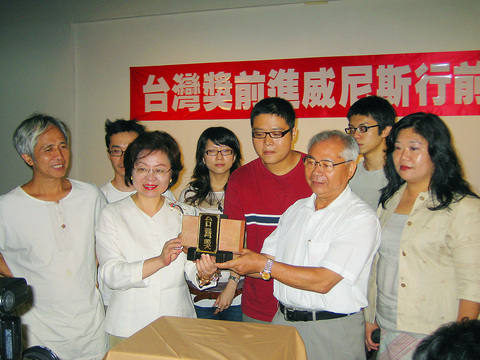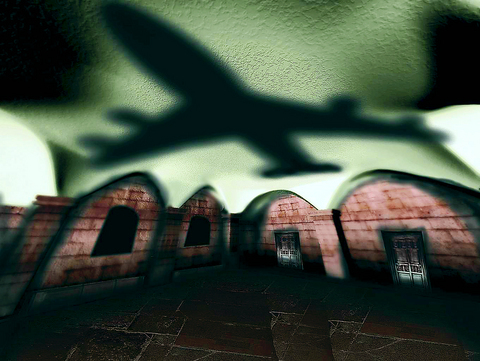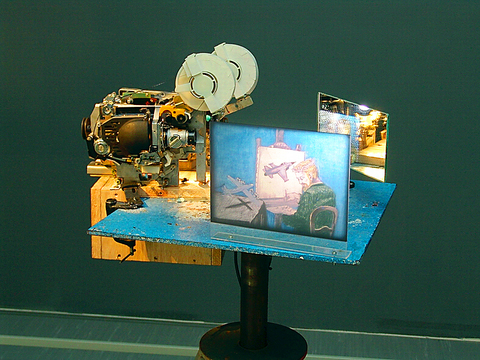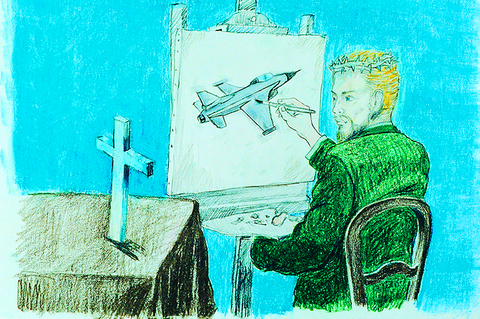Taiwan's contributions to the Venice Biennale have gained recognition from the international art community, but this year four graduate students from Taipei National University of the Arts (TNUA) have decided to turn things around with a fresh idea and US$20,000.
The students are members of the Hedao Group (
Hedao's projects are designed to create the maximum impact: Instead of manipulating physical objects to create art, they seeks to manipulate the institutions that evaluate art.

PHOTO: MEREDITH DODGE, TAIPEI TIMES
They do this by raising money for cash awards to be given at major art exhibitions. This year the "Taiwan Award" of US$20,000 will be handed over to the winner of their choice at the Venice Biennale on June 11.
The Hedao Group intends to subvert the process of cultural colonization and globalization by creating the award. It reasons that Taiwan is a small country that struggles to be recognized in the world of contemporary art, where discourse is dominated by a Western point of view.
What the Hedao Group intends to take to Venice is not a work of art to be judged, but rather a unique Taiwanese viewpoint with which to judge other works of art.

PHOTOS COUTESY OF TFAM
The Hedao Group flier states that "the Taiwan Award seeks to reverse the subject-object relationship, adopting the role of observer and a specifically Taiwanese viewpoint to assess the Venice Biennale."
The Hedao Group raised the cash for the Taiwan Award by going around the country
fundraising. Most of the donations were from individuals and non-profit organizations, rather than large corporations or public agencies.

"There were book clubs that donated, [even] housewives that found ways to save an extra NT$1,000 per month" said group member Lu Hao-yuan (
Besides monetary contributions, the Hedao Group has gained support of another kind. In order to ensure that the Taiwan Award accurately represents Taiwan's viewpoint, the group's members asked accomplished Taiwanese cultural figures from a variety of disciplines to serve as judges for the award.
The panel they assembled includes filmmaker Tsai Ming-liang (

The Hedao Group created a stir with their first "meta" art project, An Award for Taipei Biennale. It hopes to continue subverting the politics and structure of arts exhibitions and awards by taking the Taiwan Award to New York's Whitney Biennial and Germany's Kassel Documental X.
The group, plus the judges and accompanying art critics, will head for Venice this Saturday. Deliberations will begin next Thursday and the award will be presented at the Hotel Monaco and Grand Canal, on June 11.
The trophy for the award, designed by Zhuang Wu-nan (

In the March 9 edition of the Taipei Times a piece by Ninon Godefroy ran with the headine “The quiet, gentle rhythm of Taiwan.” It started with the line “Taiwan is a small, humble place. There is no Eiffel Tower, no pyramids — no singular attraction that draws the world’s attention.” I laughed out loud at that. This was out of no disrespect for the author or the piece, which made some interesting analogies and good points about how both Din Tai Fung’s and Taiwan Semiconductor Manufacturing Co’s (TSMC, 台積電) meticulous attention to detail and quality are not quite up to

April 21 to April 27 Hsieh Er’s (謝娥) political fortunes were rising fast after she got out of jail and joined the Chinese Nationalist Party (KMT) in December 1945. Not only did she hold key positions in various committees, she was elected the only woman on the Taipei City Council and headed to Nanjing in 1946 as the sole Taiwanese female representative to the National Constituent Assembly. With the support of first lady Soong May-ling (宋美齡), she started the Taipei Women’s Association and Taiwan Provincial Women’s Association, where she

It is one of the more remarkable facts of Taiwan history that it was never occupied or claimed by any of the numerous kingdoms of southern China — Han or otherwise — that lay just across the water from it. None of their brilliant ministers ever discovered that Taiwan was a “core interest” of the state whose annexation was “inevitable.” As Paul Kua notes in an excellent monograph laying out how the Portuguese gave Taiwan the name “Formosa,” the first Europeans to express an interest in occupying Taiwan were the Spanish. Tonio Andrade in his seminal work, How Taiwan Became Chinese,

Mongolian influencer Anudari Daarya looks effortlessly glamorous and carefree in her social media posts — but the classically trained pianist’s road to acceptance as a transgender artist has been anything but easy. She is one of a growing number of Mongolian LGBTQ youth challenging stereotypes and fighting for acceptance through media representation in the socially conservative country. LGBTQ Mongolians often hide their identities from their employers and colleagues for fear of discrimination, with a survey by the non-profit LGBT Centre Mongolia showing that only 20 percent of people felt comfortable coming out at work. Daarya, 25, said she has faced discrimination since she